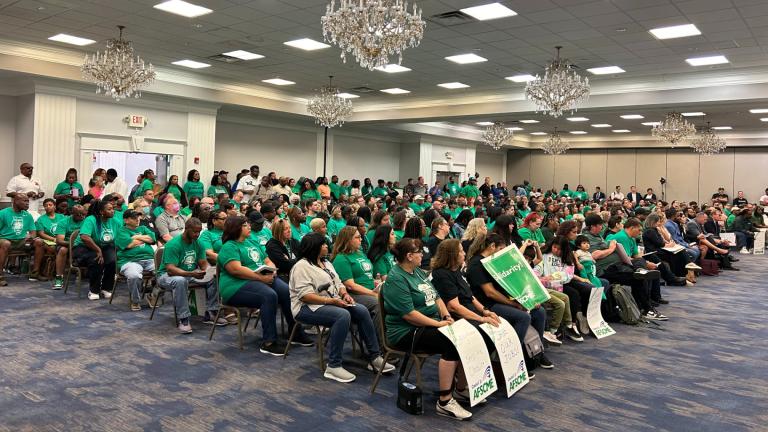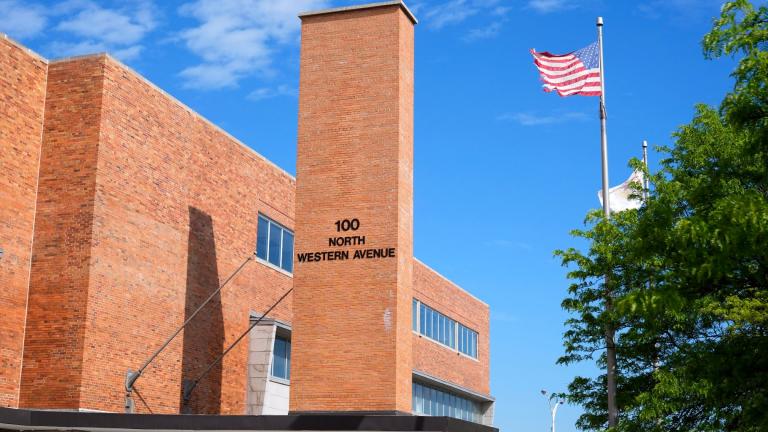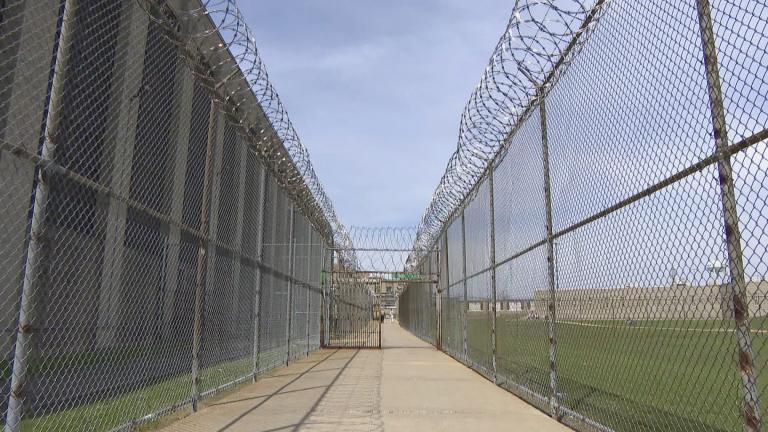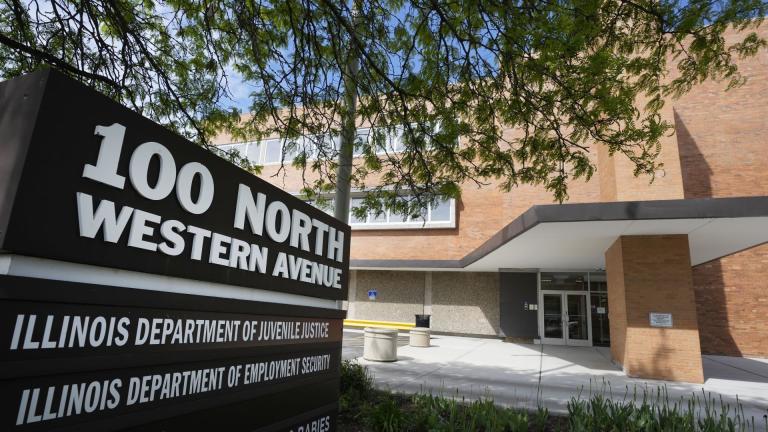Video: Joining “Chicago Tonight” on June 18, 2024, to discuss the prison closures are Colette Payne, director of the Reclamation Project at the Women’s Justice Institute; Anders Lindall, public affairs director for AFSCME Council 31; and state Rep. C.C. Davidsmeyer. (Produced by Paul Caine)
An anticipated advisory vote over closing and rebuilding two Illinois prisons did not happen Friday, as quorum was not met by the Commission on Government Forecasting and Accountability, a bipartisan group consisting of 12 state legislators.
Just three of the 12 members met in Springfield Friday; one lawmaker noted the planned hybrid hearing was moved to in-person.
But those who did show up said Gov. J.B. Pritzker’s administration lacked robust plans for the future of Logan and Stateville correctional centers, with state Rep. C.D. Davidsmeyer (R-Murrayville), the co-chair of COGFA, calling the proposals “far from shovel-ready.”
State Sen. David Koehler (D-Peoria) said that “anytime the department presents a plan,” the commission would be available to make a recommendation.
“I do support the proposal to build new state-of-the-art correctional facilities,” said Koehler, who also co-chairs COGFA. “[But] This is really a concept and not a plan … because a plan has details.”
“I will encourage them not to move forward with this closure plan, but certainly move forward with the reconstruction of Stateville immediately and to work with stakeholders, specifically on the women’s facility at Logan,” Davidsmeyer said.
The Pritzker administration ultimately makes the final decision; the recently passed 2025 fiscal year budget includes $900 million for capital investments to rebuild Stateville and Logan correctional centers.
COGFA facilitates the closure process of state facilities.
“Today’s outcome, and the large crowds and countless concerns raised at this week’s COGFA hearings in Joliet and Lincoln, all affirm the same thing: The Department of Corrections should rescind its closure threats, slow down, and work with our union and other concerned parties to develop a better rebuilding plan,” AFSCME Council 31, the union that represents most employees within the Illinois Department of Corrections, said in a statement.
“I don’t necessarily think it’s going to alter whatever process was already in place, or timeline was already in place, or plans on the rebuild,” said Jenny Vollen-Katz, executive director of the prison watchdog group the John Howard Association.
An IDOC spokesperson in a statement Friday said the department was committed to transparency and will continue to seek input to create “a better comprehensive plan moving forward.”
“The Department’s goal in announcing its intent to rebuild Stateville and Logan Correctional Centers was to present a starting point and create an open process in which feedback from all impacted stakeholders is considered - not to present a complete plan without discussing it with all involved,” the statement said.
Pritzker’s administration has proposed closing and rebuilding Logan, one of the state’s two women’s prisons, and Stateville, a men’s prison in Crest Hill. Two hearings this week — a Thursday hearing in Lincoln over Logan and a Tuesday hearing in Joliet over Stateville — were part of COGFA’s facility closure process.
Like Tuesday’s hearing, the crowd of hundreds in Lincoln on Thursday was packed with facility workers and their supporters; the Lincoln Junior High School Auditorium was filled with green AFSCME shirts reading “Logan CC belongs in Logan County.” Outside of the school, houses and businesses of Lincoln donned bright red “Save Logan Correctional Center” lawn signs.
 Signs expressing support for Logan Correctional Center’s continued operation dot lawns in Lincoln, where Logan is located. (Hannah Meisel / Capitol News Illinois)
Signs expressing support for Logan Correctional Center’s continued operation dot lawns in Lincoln, where Logan is located. (Hannah Meisel / Capitol News Illinois)
AFSCME Council 31 supports building a new women’s correctional facility. However, the union strongly opposes that facility’s relocation.
“If you close Lincoln, you’re going to destroy my hometown,” said Marcia Mibbs, who testified at Thursday’s hearing that she and family members have worked at Logan.
Shanice Page with the Reclamation Project, a Chicago-based advocacy group for justice-impacted women and families, read the testimony of a woman currently incarcerated in Logan, who said it’s “the worst facility” she has ever been in.
“I have a lot to say about why this institution should be closed down immediately, but I am also aware of the retaliation that would likely take place against me if I choose to speak out,” Page said while reading the woman’s testimony.
Sandra Brown, with the Women’s Justice Institute, an advocacy group for justice-impacted women, recalled horrifying conditions she said she experienced while incarcerated at Logan: destroyed cells, ripped cables, ice machines with feces in them and mattresses saturated with bodily waste.
“No human being should ever have to fathom such atrocities,” Brown said. “But such atrocities were exactly what I experienced.”
IDOC’s “preferred plan” is for Logan to be rebuilt on available ground on Stateville’s 2,000-acre site, about 150 miles from Logan’s current central Illinois location. So, at the end of the projected five-year rebuild timeline, both Logan and Stateville would be located on Stateville’s current Crest Hill property.
According to an IDOC report from April, “A move to Crest Hill would permit a more regionalized approach for the women’s facilities by providing a northern facility to pair with the already centrally located facility in Decatur,” a reference to the other women’s prison in Illinois.
“However, no decision on location has been finalized,” IDOC Acting Director Latoya Hughes said at the Thursday hearing. “It is also accurate that the department does not yet have completed facility design.”
The department has said it intends to continue to house incarcerated people at Logan until the rebuild is complete. IDOC estimates the Logan rebuild will cost up to $425 million.
 Hundreds of Logan Correctional Center workers and supporters gather at the Lincoln Junior High School, 208 Broadway St., Lincoln, Ill., on Thursday, June 13, 2024, to protest the proposed relocation of the prison. (Blair Paddock / WTTW News)
Hundreds of Logan Correctional Center workers and supporters gather at the Lincoln Junior High School, 208 Broadway St., Lincoln, Ill., on Thursday, June 13, 2024, to protest the proposed relocation of the prison. (Blair Paddock / WTTW News)
The governor announced the prison closure plan in March, 10 months after the administration received a commissioned report from justice facility planning firm CGL Companies on the deferred maintenance of state prisons.
That report found that Logan is “inefficient, ineffective, and unsuitable for any population.”
Logan opened in the 1870s as the Illinois Asylum for Feeble-Minded Children, transferring to IDOC in 1978.
The correctional center’s main power source is a coal-fired power plant that has likely reached the “end of its life,” according to that report. The housing units are in poor condition and not supportive of a rehabilitative environment, as most were designed as patient wards and not for correctional housing, the report adds.
IDOC officials said moving Logan to northern Will County would permit a “regionalized approach” that would enhance women’s access to their families, support services, vocational opportunities and community resources. More than 40% of women in Logan come from Cook County or the collar counties, Hughes said.
As of April 15, Logan housed 1,081 people, according to IDOC officials. There are 1,541 women in custody within the entire Department of Corrections.
When Colette Payne, with the Reclamation Project, was incarcerated at Logan, it wasn’t a guarantee she’d see her three children because of the distance from the prison to her home in Chicago.
“I remember seeing them once out of the two years I was there because of the cost; the cost for gas, the cost for food, it’s expensive,” Payne said.
She said while she is not supportive of building new prisons, she is supportive of bringing them closer to Chicago.
“These hearings have been held in communities that they say are impacted because of the closure, not taking a look at the communities that are disproportionately impacted by the distance,” Payne said.
However, that push for moving the prison is in large part why droves of workers showed up at Thursday night’s meeting.
“The department uses regionalization, well that sounds good,” said Mike Newman, deputy director of AFSCME Council 31. “... It is not grounded in the actual operations of the department.”
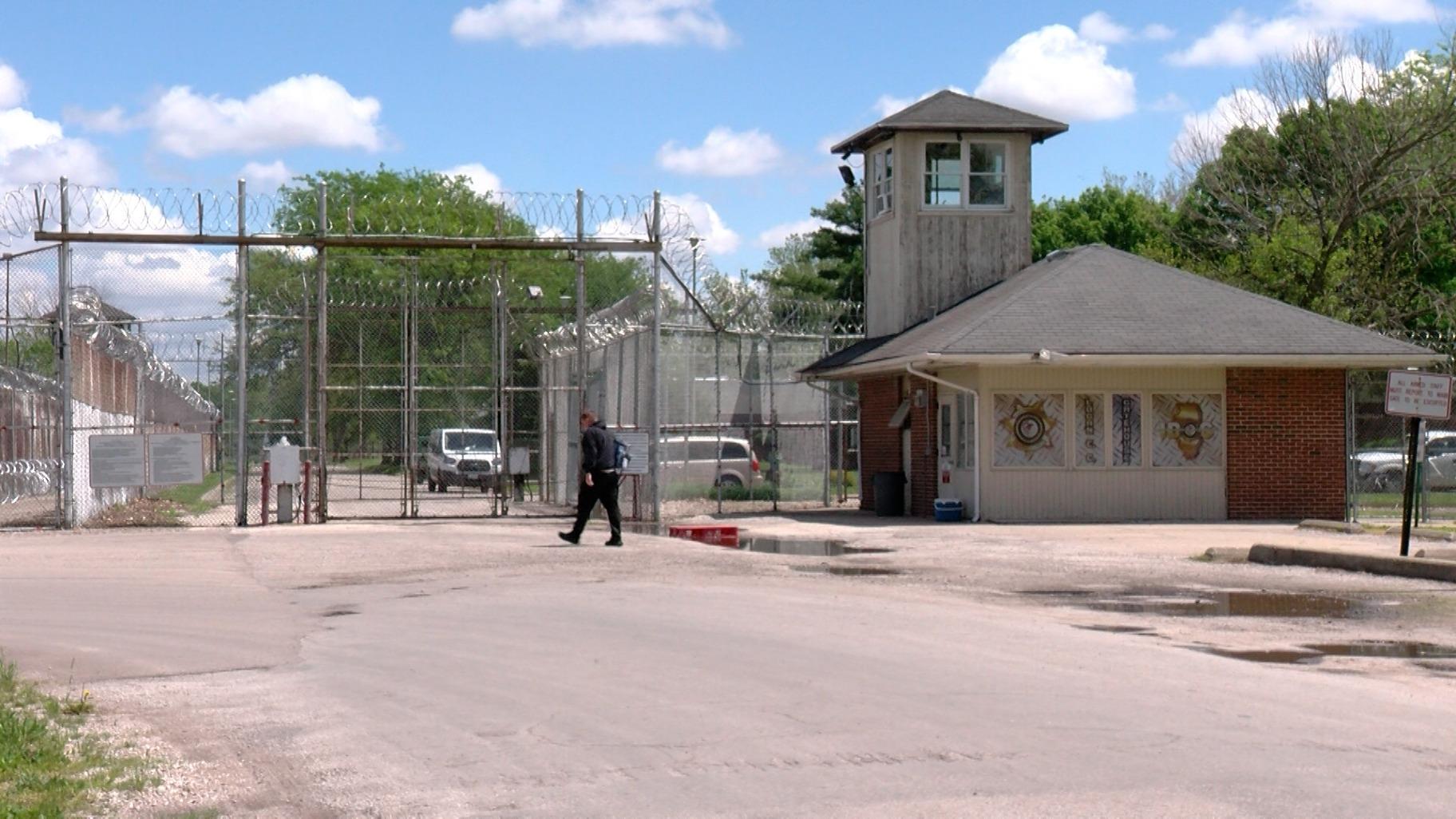 Logan Correctional Center is pictured in Lincoln. (Andrew Campbell / Capitol News Illinois)
Logan Correctional Center is pictured in Lincoln. (Andrew Campbell / Capitol News Illinois)
Kenny Johnson, who said he has worked at Logan for 13 years, said Logan workers have the knowledge to serve a unique population, like transgender people. If Logan is rebuilt in Crest Hill, the prison would lose “vital staff,” he said, because families would not relocate two hours north.
“The individuals in custody deserve a better place to live and our staff deserve a better place to work,” Johnson said, “and that better place belongs right here in Logan County.”
As with Stateville, IDOC has stated it does not expect any state employees at Logan to lose state employment during this process. As of May 15, Logan employed a total of 447 staff categorized as 351 security personnel and 96 non-security employees, according to the department.
Not including the Logan prison, there are two correctional facilities located within 40 miles of Logan County and four additional facilities within 90 miles. The department estimates there will be approximately 850 positions available in these other department facilities within the 90-mile radius. These facilities include Lincoln Correctional Center, Decatur Correctional Center, Pontiac Correctional Center, Jacksonville Correctional Center, Illinois River Correctional Center and Taylorville Correctional Center.
Workers and residents are concerned about the economic impact closing the prison could have, especially after the closure of two local colleges over the past couple of years.
“If we lose the prison as well, then many families will have to consider relocating just to sustain their lives,” said Marrisa Hayes, a correctional officer at Logan.
Pritzker told local officials in May to “not rely upon a state-run facility that’s a prison” for economic development.
Note: This article has been updated with a statement from IDOC.


